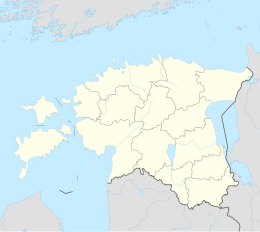Suure-Jaani
| Suure-Jaani | |||
|
|||
| State : |
|
||
| Circle : |
|
||
| Coordinates : | 58 ° 32 ' N , 25 ° 28' E | ||
| Height : | 73 m | ||
| Area : | 2.22 km² | ||
| Residents : | 1,238 (2006) | ||
| Population density : | 558 inhabitants per km² | ||
| Time zone : | EET (UTC + 2) | ||
| Postal code : | 71502 | ||
| Mayor : | Ülo Köst | ||
| Postal address : | Lembitu pst. 42 71502 Suure-Jaani |
||
| Website : | |||
|
|
|||
Suure-Jaani (Eng .: Greater St. Johannis ) is a town in the municipality of Põhja-Sakala in the northeast of the Estonian district of Viljandi .
history
The oldest finds in the area of Suure-Jaani can be traced back to the 6th millennium BC. To date.
The decisive and tragic battle of the ancient Estonians for freedom took place in the community of Suure-Jaani on St. Matthew's Day (September 21) in 1217.
The present city developed around the church of Saint John the Apostle , which was built in the middle of the 14th century. This place was originally called Valula (or "Valle"). First mentioned in 1423 (?).
The current name Suure-Jaani, which has been used since the 17th century, is the Estonian equivalent of the German name of the church. Church services are still celebrated in the church.
The city was an important cultural center in Estonia during the national awakening in the 19th century. Impetuous construction began in the last decade of the 19th century.
On May 1, 1938, Suure-Jaani received city rights . From 2005 to 2017, the city was part of the Suure-Jaani municipality , then the newly established Põhja-Sakala municipality .
Town twinning
Suure-Jaani is twinned with cities
Culture and sights
Buildings
At the end of the 12th century, Lehola Fortress was built on a site about two kilometers north-east of the city (now known as Lõhavere ) . The fortress was the center of the historic Estonian region of Sakala and the center of the struggle of the Estonians against the German Brotherhood of the Sword in the 13th century. Not much more than a hill remains from the fortress, but it is still a tourist attraction (this place is known in Estonia as Lembitu linnamägi ).
Personalities
Famous resident of the city was the composer Artur Kapp (1858–1952). In his memory, the summer festival has been held in Suure-Jaani since 1998, under the artistic direction of the composer and organist Andres Uibo (* 1956).







